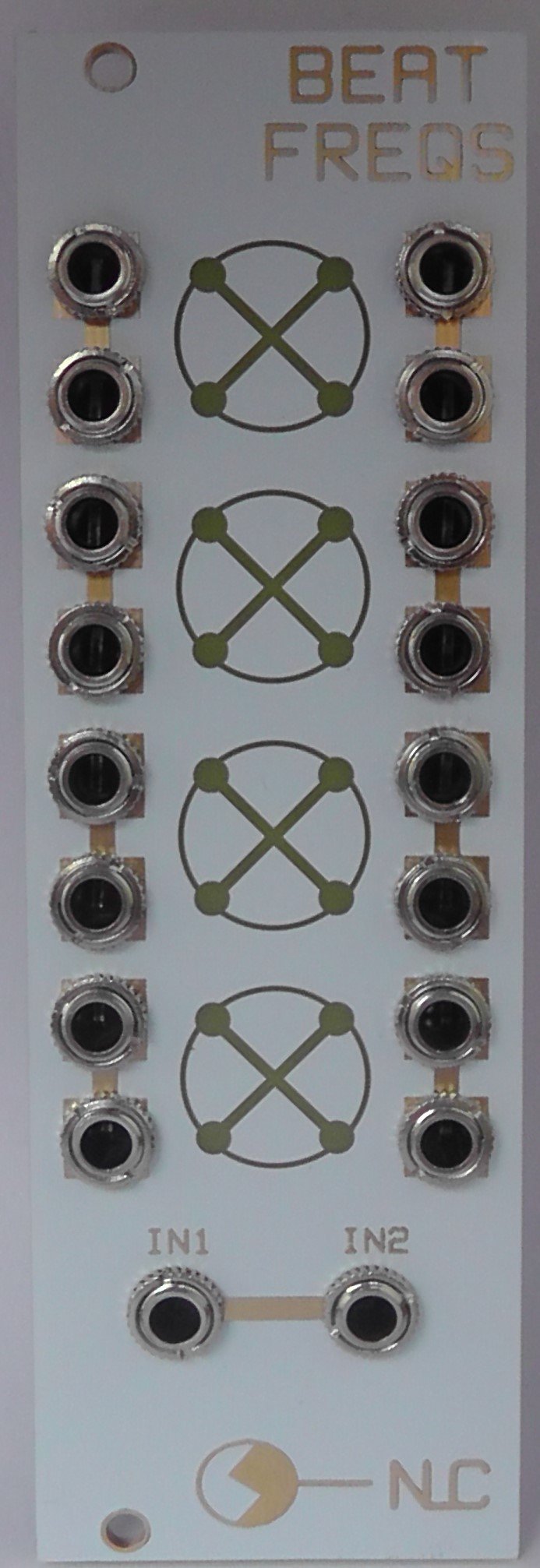BEAT FREQS
Description/Usage
8hp
The idea for this module came from a schematic that has been floating around the web for years - 'beat frequency indicator' This version drops the CV, pots and XNOR output of the original ‘Beat Freq’ and instead gets 12 extra gate outputs and a lot more flashing LEDs.
The idea is to feed the circuit two signals and depending upon which one had the higher frequency the ring of 4 LEDs would light up in a clockwise or anti-clockwise direction. The speed of rotation would indicate how close or disparate the frequencies are. If the signals have the same frequency then just one LED is lit.
In operation this module is quite unique; gates come in spurts. The circular LED displays jerk around. Sometimes they complete several revolutions confidently and then stutter between two stages, sometimes they shimmer on one spot.
At both audio rates and clock rates, this module can be quite unpredictable but always seems to be putting out useful patterns.
It is easy enough to see the patterns from the 4 sets of LEDs. The topmost one is the main output, the 2nd one down runs at half the rate, the 3rd one jitters across diagonal LEDs, stepping between pairs. The bottom set, runs at a similar pace as the topmost but does it in bursts, rather than a continuous pattern.
Assembled modules usually ship in 1-2 weeks.
DIY
Description/Usage
8hp
The idea for this module came from a schematic that has been floating around the web for years - 'beat frequency indicator' This version drops the CV, pots and XNOR output of the original ‘Beat Freq’ and instead gets 12 extra gate outputs and a lot more flashing LEDs.
The idea is to feed the circuit two signals and depending upon which one had the higher frequency the ring of 4 LEDs would light up in a clockwise or anti-clockwise direction. The speed of rotation would indicate how close or disparate the frequencies are. If the signals have the same frequency then just one LED is lit.
In operation this module is quite unique; gates come in spurts. The circular LED displays jerk around. Sometimes they complete several revolutions confidently and then stutter between two stages, sometimes they shimmer on one spot.
At both audio rates and clock rates, this module can be quite unpredictable but always seems to be putting out useful patterns.
It is easy enough to see the patterns from the 4 sets of LEDs. The topmost one is the main output, the 2nd one down runs at half the rate, the 3rd one jitters across diagonal LEDs, stepping between pairs. The bottom set, runs at a similar pace as the topmost but does it in bursts, rather than a continuous pattern.
Assembled modules usually ship in 1-2 weeks.
DIY
Description/Usage
8hp
The idea for this module came from a schematic that has been floating around the web for years - 'beat frequency indicator' This version drops the CV, pots and XNOR output of the original ‘Beat Freq’ and instead gets 12 extra gate outputs and a lot more flashing LEDs.
The idea is to feed the circuit two signals and depending upon which one had the higher frequency the ring of 4 LEDs would light up in a clockwise or anti-clockwise direction. The speed of rotation would indicate how close or disparate the frequencies are. If the signals have the same frequency then just one LED is lit.
In operation this module is quite unique; gates come in spurts. The circular LED displays jerk around. Sometimes they complete several revolutions confidently and then stutter between two stages, sometimes they shimmer on one spot.
At both audio rates and clock rates, this module can be quite unpredictable but always seems to be putting out useful patterns.
It is easy enough to see the patterns from the 4 sets of LEDs. The topmost one is the main output, the 2nd one down runs at half the rate, the 3rd one jitters across diagonal LEDs, stepping between pairs. The bottom set, runs at a similar pace as the topmost but does it in bursts, rather than a continuous pattern.
Assembled modules usually ship in 1-2 weeks.



